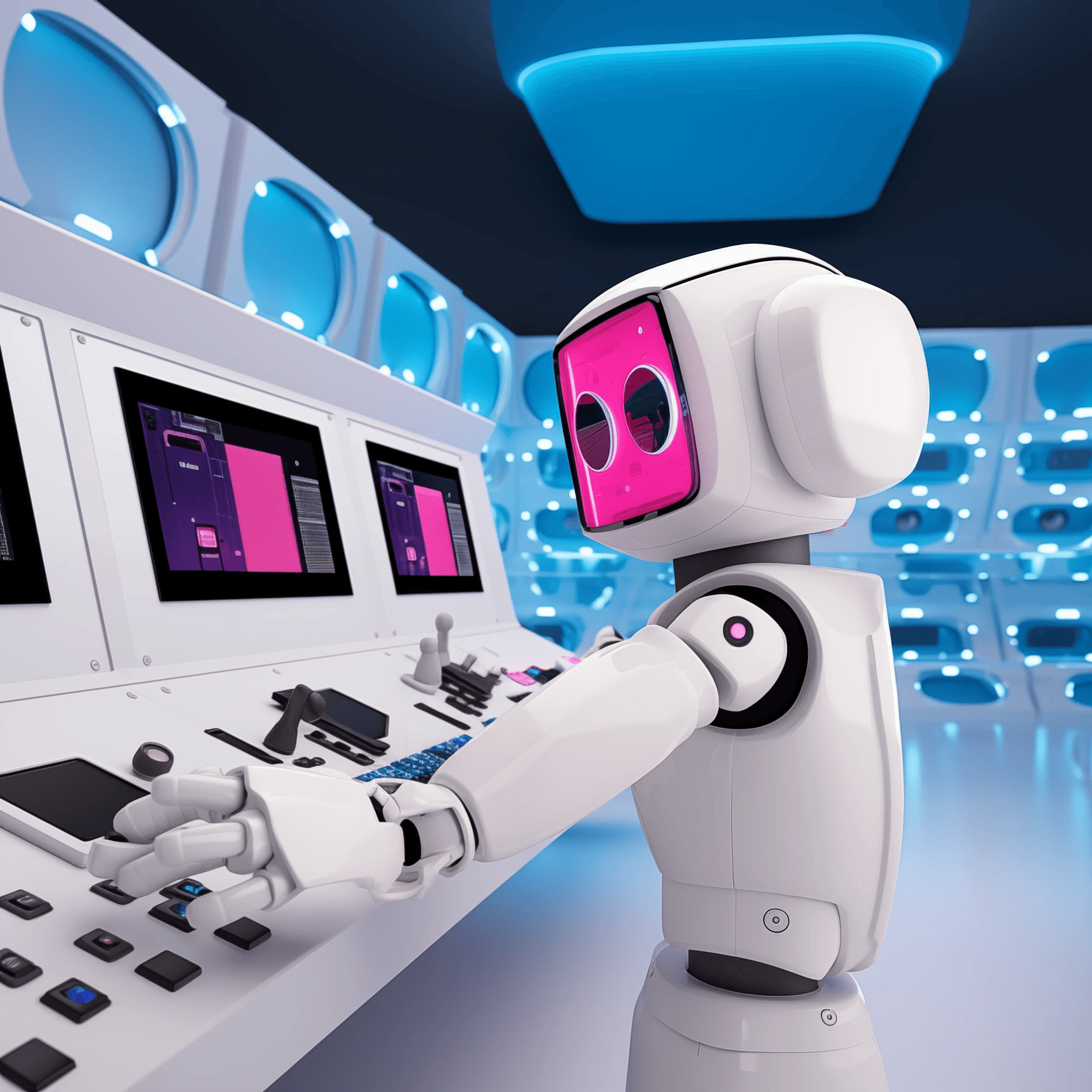AI Agents: The Future of Automated Intelligence

[This is an outline of notes, not real copy for an article. That will come soon.]
iness landscape, not just by doing stuff for us, but by making decisions for us autonomously. It's not really a new concept: Businesses have always had "agents" working on their behalf: from employees to contractors to service providers. The thing that's new is that now some of the people acting as our agents are artificial.
Before and After AI Agents
Consider a common situation faced by businesses: an unexpected power outage in the middle of the night that isn't likely to be resolved soon, rendering a location inoperable for business the next morning.
Before AI Agents:
It's after midnight, and a manager receives a security alert about the power failure. What follows is a hectic scramble – notifying employees, emailing clients, pausing marketing campaigns – all executed in a state of urgency and prone to human error.
After AI Agents:
Now, picture the same scenario with an AI agent at the helm. Before the manager even becomes aware of the issue, the AI agent has evaluated the situation. Unable to reach the manager, it formulates a plan: employees are informed, clients are updated, and marketing campaigns are adjusted, all before the manager is aware. The situation is already under control by the time the manager finally wakes up and looks at a phone.
The security system that alerted the manager in the 'before' scenario acted as an agent on the manager's behalf: Notifying them of a problem. The difference is the new capabilities enabled by giving the agent a level of autonomy.
Autonomy in AI Agents
The concept of autonomy in AI agents varies significantly, ranging from basic task execution to complex, adaptive decision-making.
Basic Task Execution
At the fundamental stage, AI agents perform specific tasks based on direct commands. They operate like digital assistants, capable of executing simple, predefined actions. This could involve turning lights on or off, playing music, or setting reminders—actions that require minimal decision-making. "Hey Siri, turn off the lights in the living room."
Conditional Autonomy
Moving up the scale, more-advanced AI agents exhibit conditional autonomy. They are programmed to make decisions within a set framework of parameters. An example is a customer service bot programmed to handle routine questions while escalating more complex issues. These agents can adapt to a variety of scenarios but are limited to their programmed rules and guidelines.
Adaptive Decision-Making
The most advanced AI agents learn from interactions, adapt to new and unforeseen situations, and make informed decisions. Such agents could include AI-driven analytics systems that not only process data but also proactively suggest business strategies based on emerging patterns. This stage reflects a significant advancement, allowing AI agents to operate in dynamic, unpredictable environments and provide valuable strategic insights.
In each stage, AI agents evolve from simple tools executing predefined tasks to sophisticated partners capable of handling more responsibilities. Entrusting anything with an agent, human or otherwise, is all about shifting responsibilities to them.
Entrusting Responsibilities to AI Agents
As AI agents evolve, the range of responsibilities they can assume expands, highlighting a pivotal shift in how businesses operate. This section explores the implications of entrusting more complex tasks to AI agents and the considerations businesses must navigate.
Delegating Routine Tasks
The first step in integrating AI agents is often delegating routine, time-consuming tasks. This includes managing schedules, filtering emails, or handling customer inquiries. By automating these tasks, businesses can free up human resources for more strategic, creative work that requires human insight.
Financial Decision-Making and Risks

Ethical Considerations and Public Perception
Entrusting responsibilities to AI agents also brings ethical considerations to the forefront. Issues like data privacy, the transparency of decision-making processes, and potential biases in AI algorithms must be addressed. Additionally, public perception — whether AI agents are viewed as beneficial tools or threats to job security — can significantly influence a company's reputation and the morale of its workforce.
Preparing for the Future
Looking ahead, businesses must prepare for a landscape increasingly influenced by AI. This preparation goes beyond technological upgrades; it entails cultivating a culture that is open to innovation yet mindful of its broader implications. Training staff to collaborate effectively with AI agents, understanding the legal and ethical frameworks surrounding AI, and developing strategies to integrate AI into various business processes are essential steps in this journey.
In entrusting more complex responsibilities to AI agents, businesses are not just embracing a new technological tool; they are stepping into a new era of operational efficiency and strategic innovation. The key lies in navigating this transition with a balanced approach, ensuring that AI agents enhance human capabilities rather than replace them.
Integration and Collaboration: AI Agents and Human Workers
The introduction of AI agents in business is about fostering a collaborative environment, where artificial and human intelligences work in unison. This section explores how this integration can refine business processes and redefine the roles of human workers in an AI-enhanced workplace.
Enhancing Business Processes with AI Agents
AI agents contribute more than just task automation; they offer a level of insight and operational efficiency that can significantly transform business operations. Their involvement ranges from optimizing supply chain management to providing real-time analytics, leading to substantial improvements in both operational efficiency and strategic decision-making.
People Skills in an AI World
In a workforce that relies more on artificial people than on old-fashioned computer programs, the 'soft skills' become increasingly critical. People skills are vital for leveraging the capabilities of AI agents. Humans excel in areas where nuanced understanding and emotional intelligence play a crucial role, making them indispensable in an AI-augmented environment. This complementary relationship between AI efficiency and human insight is crucial for businesses aiming to fully harness the potential of AI agents.
Training and Upskilling for AI Collaboration
The growing presence of AI in the workplace necessitates a shift in skill sets. Training and upskilling become essential, equipping employees to interact effectively with AI systems. Understanding AI functionality, interpreting data, and managing AI-driven processes are becoming integral parts of the modern workplace.
Developing AI-Human Collaborative Strategies
Businesses must strategically plan how AI agents and human workers can best collaborate. Identifying areas where AI can augment human efforts and setting clear interaction guidelines are key. Fostering a culture that sees technological advancement as a tool for human empowerment is crucial in making this collaboration successful.
The Future of Work
The integration of AI agents signals a redefinition of work, emphasizing collaboration over replacement. In this new era, the role of human workers evolves, focusing more on areas where human insight is irreplaceable. This collaborative future promises innovation, efficiency, and a dynamic growth environment where AI and humans work together to achieve shared goals.
Challenges and Considerations in Implementing AI Agents
While the integration of AI agents offers numerous benefits, it's not without its challenges. This section discusses key considerations and potential obstacles businesses may encounter when implementing AI agents.
Technical and Operational Challenges
Deploying AI agents involves navigating a complex landscape of technical requirements and operational changes. Businesses must consider the integration of these agents with existing systems, the scalability of solutions, and the continuous need for technical updates and maintenance. Ensuring compatibility and minimizing disruption during the transition are crucial.
Data Security and Privacy Concerns
With AI agents handling vast amounts of data, security and privacy become paramount. Businesses must establish stringent data protection measures and comply with relevant regulations to safeguard sensitive information. This involves not only technical solutions but also policy and procedural changes to ensure data integrity.
Managing Change and Employee Adaptation
Introducing AI agents can be a significant change for employees. Managing this change requires clear communication, training programs, and support systems to help staff adapt. Addressing concerns about job security and redefining roles in an AI-enhanced workplace are vital for a smooth transition.
Cost and Return on Investment
The cost of implementing AI agents can be substantial, and businesses need to assess the potential return on investment carefully. This includes considering not only the initial expenditure but also the long-term benefits in terms of efficiency, productivity, and competitive advantage.
Embracing the Era of AI Agents
As we delve into the realm of AI agents, it's clear that they represent more than just a technological advancement; they signify a fundamental shift in how businesses operate and interact with technology. This conclusion synthesizes the key insights from the article and looks to the future.
A Transformative Shift in Business Operations
The integration of AI agents marks a transformative era in business. From automating routine tasks to making complex decisions, AI agents are redefining efficiency and strategic planning. Their ability to adapt, learn, and work collaboratively with humans is not just an enhancement of business processes; it's a reimagining of them.
Navigating the Challenges
While the path to integrating AI agents is lined with challenges, from technical hurdles to ethical considerations, navigating these challenges is crucial for harnessing the full potential of AI. The key is a balanced approach that respects both the power and the limitations of AI, while always prioritizing human insight and values.
Looking Forward
As we look to the future, the possibilities presented by AI agents are vast. The businesses that will thrive are those that embrace these changes, adapt to new paradigms, and view AI agents as partners in their journey towards innovation and growth.
For businesses ready to step into this new era, the time to act is now. Embracing AI agents requires careful planning, strategic investment, and a commitment to continuous learning and adaptation. The future belongs to those who recognize the potential of AI to transform not just business processes, but the very nature of work and collaboration.
Embracing AI Agents with Anthus: Your Partner in Innovation
As we conclude our exploration of AI agents and their transformative impact on business, it's important to recognize the journey to integrating these technologies is complex and requires expertise. This is where Anthus comes in as your trusted partner.
Why Choose Anthus for AI Integration
At Anthus, we understand the nuances of AI agent technology and its practical application in business. Our experience and expertise in developing and deploying AI solutions position us uniquely to guide your business through this transformative process.
Tailored AI Solutions for Your Business
We believe in bespoke solutions. Understanding that each business has unique challenges and goals, we tailor our AI agent solutions to align with your specific needs. Whether it's automating routine tasks, enhancing decision-making processes, or redefining customer interactions, our solutions are designed to provide tangible benefits and a competitive edge.
A Commitment to Partnership and Growth
Choosing Anthus means more than just implementing a technology solution; it's about forming a partnership that fosters growth and innovation. We're committed to working closely with you, from initial consultation to deployment and beyond, ensuring that the integration of AI agents is smooth, effective, and aligned with your business objectives.
Get in Touch
If you're ready to explore how AI agents can revolutionize your business, or if you have questions about starting this journey, we invite you to get in touch with us. Our team at Anthus is here to help you navigate the future of automated intelligence, turning challenges into opportunities and innovations into realities.